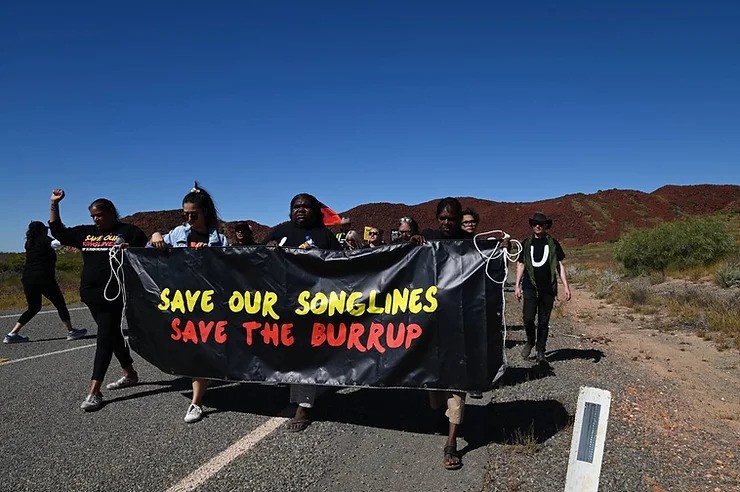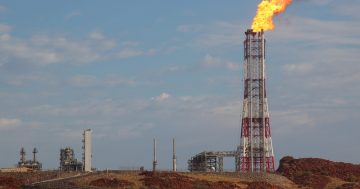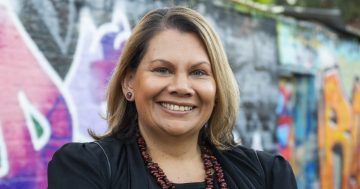
Murujuga traditional custodians last month also called for a moratorium on development in the Peninsula until an independent investigation is undertaken by the UN World Heritage Committee. Photo: Save Our Songlines.
Following the State and Federal governments’ $140 million agreement to build a hydrogen hub in the Pilbara, concerns have been raised by Federal Court victor Raelene Cooper over recent amendments proposed to the bill governing offshore oil and gas approvals.
The 50-50 contribution from each level of government into the Burrup Peninsula project is so it can become a major centre for hydrogen production and export. West Australian Premier Roger Cook said the project on Asia’s doorstep would help strengthen and diversify the state’s economy, with the potential for it to become an international gateway to Australian-made green steel and iron.
This year, construction will begin on the Pilbara Hydrogen Hub’s road and intersection, with the entire project to be operational by mid-2028. The Clean Energy Training and Research Institute will provide practical, job-focused training for the region’s citizens.
It’s expected to create almost 1000 jobs and the planned pipeline will produce enough hydrogen (492,000 tonnes a year) to decarbonise the region’s existing ammonia production.
Work on the project will be across the traditional lands of the Ngarluma and Kariyarra people, but also that of custodians represented by the Murujuga Aboriginal Corporation (MAC), a part of the Pilbara already hosting Woodside Energy’s North Rankin gas operations off the Burrup Peninsula coast, which saw an employee die on the job in June last year.
In a statement from Save Our Songlines, former MAC chair Raelene Cooper said the government was trying to slip amendments into the Offshore Petroleum and Greenhouse Gas Storage (OPGGS) Act to fast-track project approvals.
“The government said it wanted more Indigenous consultation but now, just months after the Voice failed, they are undermining their own review process and sneaking things into legislation to avoid consulting with traditional custodians,” she said.
“It is shameful the government is using a bill, designed to protect workers after injuries and death at Woodside’s Burrup Hub, to wipe out environmental approvals.”
Ms Cooper was especially upset that the government had introduced the new laws “to sidestep regulations and whitewash community concerns” before completion of Federal Resource Minister Madeleine King’s review of the National Offshore Petroleum Safety and Environmental Management Authority (NOPSEMA).
Introduced in last year’s budget, the $6m review was prompted by a court overturning NOPSEMA’s regulatory approval of Santos’s $6 billion Barossa gas project in the Timor Sea.
The company had not adequately consulted fishers from the Tiwi Islands, which the court ruled on by demanding NOPSEMA expand its requirements for Indigenous consultation for offshore projects.
While it paved the way for multiple legal challenges on other offshore projects such as Woodside Energy’s $16.5b Scarborough venture, clarity on the requirements was not provided by the regulator.
It was only last month that Ms King released a consultation paper for her review, on how to ensure effective consultation with Indigenous communities for new offshore projects and identify a relevant person for that work.
But Ms Cooper believes Ms King is taking her instructions from the oil and gas industry due to its criticism of the challenges. The industry alleged the requirements were being exploited by green activists to stop the projects, but the Australasian Centre for Corporate Responsibility argues it’s merely a distraction from company errors.
“This is just another move designed to cut Aboriginal people out of decision-making and to silence Aboriginal voices,” Ms Cooper said. “Meanwhile, the gas industry has set up their own traditional owner body, the Sea Country Alliance, who give the government what they want – a green light to keep putting projects on our songlines and sacred sites.”
Half a billion dollars has been invested by the Commonwealth into building regional hydrogen hubs across the country. Estimates on Australia’s hydrogen industry state that by 2050 it will generate $50b in additional GDP and create more than 16,000 jobs across regional areas, with an additional 13,000 for constructing renewable energy infrastructure.




